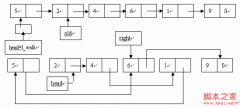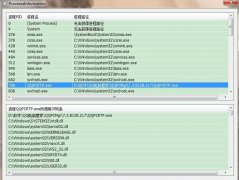C语言库函数(T类字母)
函数名: tan
功 能: 正切函数
用 法: double tan(double x);
程序例:
#include
#include
int main(void)
{
double result, x;
x = 0.5;
result = tan(x);
printf("The tan of %lf is %lf
", x, result);
return 0;
}
函数名: tanh
功 能: 双曲正切函数
用 法: double tanh(double x);
程序例:
#include
#include
int main(void)
{
double result, x;
x = 0.5;
result = tanh(x);
printf("The hyperbolic tangent of %lf is %lf
", x, result);
return 0;
}
函数名: tell
功 能: 取文件指针的当前位置
用 法: long tell(int handle);
程序例:
#include
#include
#include
#include
int main(void)
{
int handle;
char msg[] = "Hello world";
if ((handle = open("TEST.$$$", O_CREAT O_TEXT O_APPEND)) == -1)
{
perror("Error:");
return 1;
}
write(handle, msg, strlen(msg));
printf("The file pointer is at byte %ld
", tell(handle));
close(handle);
return 0;
}
函数名: textattr
功 能: 设置文本属性
用 法: void textattr(int attribute);
程序例:
#include
int main(void)
{
int i;
clrscr();
for (i=0; i<9; i++)
{
textattr(i + ((i+1) << 4));
cprintf("This is a test
");
}
return 0;
}
函数名: textbackground
功 能: 选择新的文本背景颜色
用 法: void textbackground(int color);
程序例:
#include
int main(void)
{
int i, j;
clrscr();
for (i=0; i<9; i++)
{
for (j=0; j<80; j++)
cprintf("C");
cprintf("
");
textcolor(i+1);
textbackground(i);
}
return 0;
}
函数名: textcolor
功 能: 在文本模式中选择新的字符颜色
用 法: void textcolor(int color);
程序例:
#include
int main(void)
{
int i;
for (i=0; i<15; i++)
{
textcolor(i);
cprintf("Foreground Color
");
}
return 0;
}
函数名: textheight
功 能: 返回以像素为单位的字符串高度
用 法: int far textheight(char far *textstring);
程序例:
#include
#include
#include
#include
int main(void)
{
/* request auto detection */
int gdriver = DETECT, gmode, errorcode;
int y = 0;
int i;
char msg[80];
/* initialize graphics and local variables */
initgraph(&gdriver, &gmode, "");
/* read result of initialization */
errorcode = graphresult();
if (errorcode != grOk) /* an error occurred */
{
printf("Graphics error: %s
", grapherrormsg(errorcode));
printf("Press any key to halt:");
getch();
exit(1); /* terminate with an error code */
}
/* draw some text on the screen */
for (i=1; i<11; i++)
{
/* select the text style, direction, and size */
settextstyle(TRIPLEX_FONT, HORIZ_DIR, i);
/* create a message string */
sprintf(msg, "Size: %d", i);
/* output the message */
outtextxy(1, y, msg);
/* advance to the next text line */
y += textheight(msg);
}
/* clean up */
getch();
closegraph();
return 0;
}
函数名: textmode
功 能: 将屏幕设置成文本模式
用 法: void textmode(int mode);
程序例:
#include
int main(void)
{
textmode(BW40);
cprintf("ABC");
getch();
textmode(C40);
cprintf("ABC");
getch();
textmode(BW80);
cprintf("ABC");
getch();
textmode(C80);
cprintf("ABC");
getch();
textmode(MONO);
cprintf("ABC");
getch();
return 0;
}
函数名: textwidth
功 能: 返回以像素为单位的字符串宽度
用 法: int far textwidth(char far *textstring);
程序例:
#include
#include
#include
#include
int main(void)
{
/* request auto detection */
int gdriver = DETECT, gmode, errorcode;
int x = 0, y = 0;
int i;
char msg[80];
/* initialize graphics and local variables */
initgraph(&gdriver, &gmode, "");
/* read result of initialization */
errorcode = graphresult();
if (errorcode != grOk) /* an error occurred */
{
printf("Graphics error: %s
", grapherrormsg(errorcode));
printf("Press any key to halt:");
getch();
exit(1); /* terminate with an error code */
}
y = getmaxy() / 2;
settextjustify(LEFT_TEXT, CENTER_TEXT);
for (i=1; i<11; i++)
{
/* select the text style, direction, and size */
settextstyle(TRIPLEX_FONT, HORIZ_DIR, i);
/* create a message string */
sprintf(msg, "Size: %d", i);
/* output the message */
outtextxy(x, y, msg);
/* advance to the end of the text */
x += textwidth(msg);
}
/* clean up */
getch();
closegraph();
return 0;
}
函数名: time
功 能: 取一天的时间
用 法: logn time(long *tloc);
程序例:
#include
#include
#include
int main(void)
{
time_t t;
t = time(NULL);
printf("The number of seconds since January 1, 1970 is %ld",t);
return 0;
}
函数名: tmpfile
功 能: 以二进制方式打开暂存文件
用 法: FILE *tmpfile(void);
程序例:
#include
#include
int main(void)
{
FILE *tempfp;
tempfp = tmpfile();
if (tempfp)
printf("Temporary file created
");
else
{
printf("Unable to create temporary file
");
exit(1);
}
return 0;
}
函数名: tmpnam
功 能: 创建一个唯一的文件名
用 法: char *tmpnam(char *sptr);
程序例:
#include
int main(void)
{
char name[13];
tmpnam(name);
printf("Temporary name: %s
", name);
return 0;
}
函数名: tolower
功 能: 把字符转换成小写字母
用 法: int tolower(int c);
程序例:
#include
#include
#include
int main(void)
{
int length, i;
char *string = "THIS IS A STRING";
length = strlen(string);
for (i=0; i { string[i] = tolower(string[i]); } printf("%s ",string); return 0; } 函数名: toupper 功 能: 把字符转换成大写字母 用 法: int toupper(int c); 程序例: #include #include #include int main(void) { int length, i; char *string = "this is a string"; length = strlen(string); for (i=0; i { string[i] = toupper(string[i]); } printf("%s ",string); return 0; } 函数名: tzset 功 能: UNIX时间兼容函数 用 法: void tzset(void); 程序例: #include #include #include int main(void) { time_t td; putenv("TZ=PST8PDT"); tzset(); time(&td); printf("Current time = %s ", asctime(localtime(&td))); return 0; }
- 上一篇:C语言库函数(S类字母)-2
- 下一篇:C语言库函数(U类字母)





